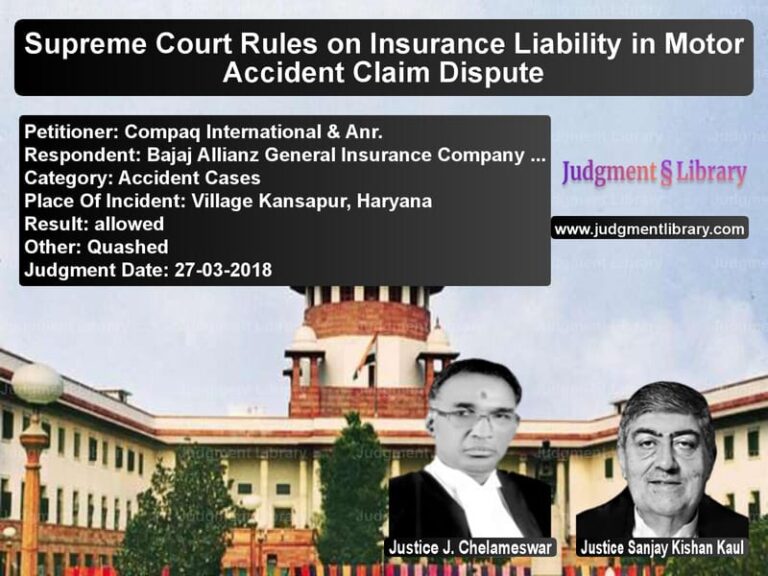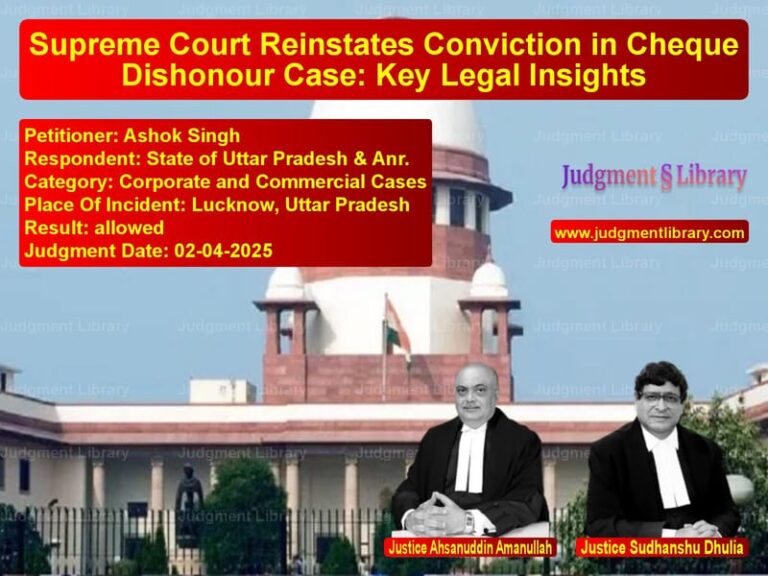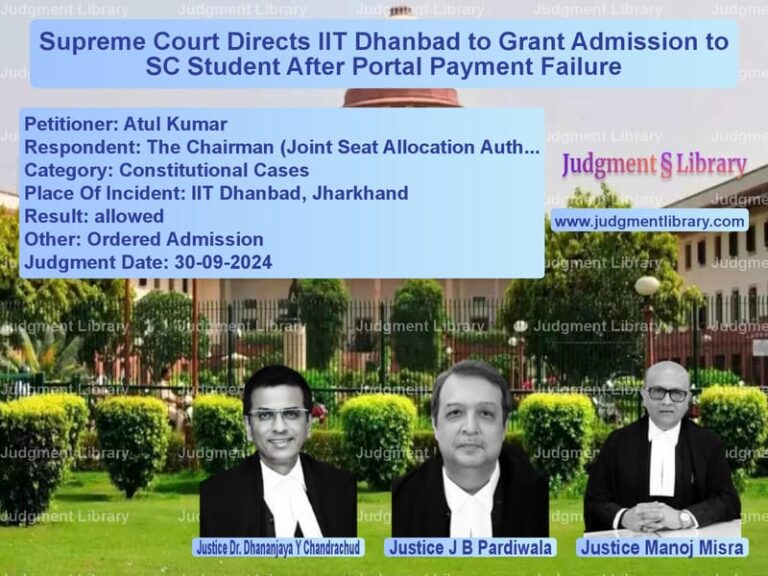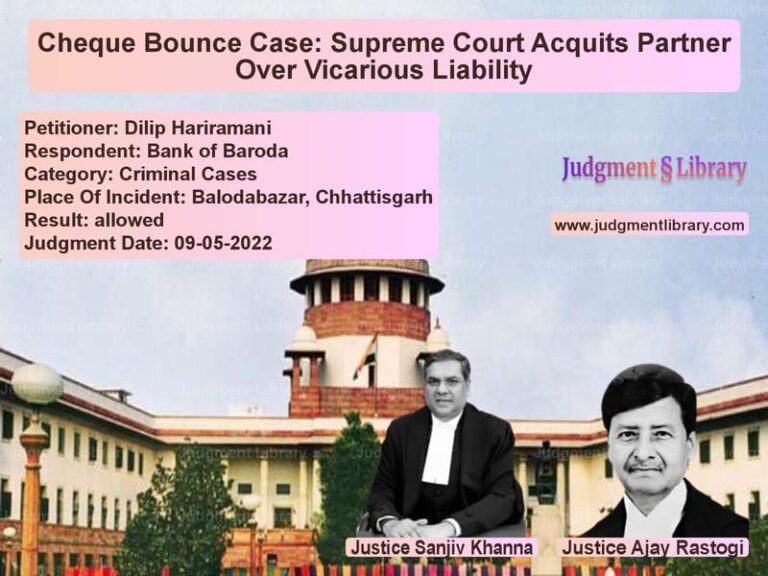Legal Dispute Over the Enforcement of Security Interests Under SARFAESI Act: Case of S. Karthik & Ors.
This case presents a classic example of how an ingenious litigant can thwart the enforcement of a security interest granted in favor of a secured creditor, thereby undermining the very purpose of the Securitisation and Reconstruction of Financial Assets and Enforcement of Security Interest Act (SARFAESI Act). The appeals at hand challenge the common judgment and order passed by the Madras High Court in 2019, which involved a complex legal dispute over the sale of mortgaged properties and the rights of the involved parties, including the borrower, guarantors, and the auction purchaser.
Background:
Ace Concrete Private Limited, the borrower in this case, had taken a loan from the Indian Overseas Bank, the respondent-bank. The appellants, along with other guarantors, had mortgaged four properties as collateral for the loan. However, due to default in repayment, the borrower’s account was categorized as a Non-Performing Asset (NPA) by the bank. Subsequently, the bank initiated proceedings under the SARFAESI Act to recover its dues by selling the mortgaged properties. Despite several attempts by the bank to sell the properties through auctions, the appellants filed multiple applications to delay or obstruct the sale, citing issues with the auction process and the calculation of dues.
Petitioner’s Arguments:
The appellants, represented by Shri K.V. Viswanathan, Senior Counsel, argued that the Second Sale Notice issued on July 9, 2012, was invalid as it violated the mandatory 30-day notice period prescribed under Rule 9 of the SARFAESI Act. The appellants contended that the sale notice provided only 10 days for the payment of dues, which was in blatant violation of the legal requirements. They further argued that the procedure followed by the bank was improper and not in accordance with the prescribed rules, making the sale null and void.
The appellants also pointed out that the sale under the First Sale Notice was scheduled for February 27, 2012, but due to interim orders passed by the Debts Recovery Tribunal (DRT), Chennai, the sale could not take place. They submitted that the delay in the process was caused by the bank’s failure to follow the legal procedure, and thus the subsequent auction should be considered invalid.
Respondent’s Arguments:
The respondent-bank, represented by Ms. Anitha Shenoy, Senior Counsel, countered the appellants’ arguments by asserting that the Second Sale Notice was a continuation of the First Sale Notice and was issued in accordance with the law. The bank argued that there was no requirement for a new 30-day notice in the case of a subsequent notice if the sale was not completed due to reasons not attributable to the borrower. The respondent-bank further emphasized that the appellants had been given several opportunities to pay the dues, but they had defaulted at every stage. The bank contended that it had complied with all legal requirements and that the auction purchaser, who had paid the sale consideration, was entitled to the properties.
Court’s Analysis:
The Court, after considering the arguments presented by both sides, turned to the provisions of the SARFAESI Act and its rules. The Court noted that under Rule 9 of the Security Interest (Enforcement) Rules, 2002, a clear 30-day notice period must be provided between the date of the sale notice and the date of the sale. The Court held that while the First Sale Notice had complied with this requirement, the Second Sale Notice issued on July 9, 2012, was in violation of this rule, as it provided only 10 days for the payment of the revised outstanding dues. The Court referred to previous judgments, including Mathew Varghese v. M. Amritha Kumar, to highlight the importance of adhering to statutory requirements in the sale process. It further emphasized that any sale conducted in violation of these rules would be null and void.
The Court also addressed the argument made by the appellants regarding the validity of the sale conducted under the Second Sale Notice. The Court held that the sale could not be considered valid unless the mandatory procedures under the SARFAESI Act, including the 30-day notice period, were properly followed. The Court acknowledged that the sale process had been fraught with delays caused by legal challenges raised by the appellants, but it emphasized that the bank was required to follow the correct procedure to ensure the legality of the sale.
Key Verbal Arguments by the Court:
The Court’s judgment included several key verbal arguments. The Court emphasized the importance of following the statutory procedure for the sale of mortgaged properties under the SARFAESI Act. It noted that the right of the borrower to redeem the property should be protected by ensuring that the legal requirements for notice and sale are strictly adhered to. The Court also observed that the failure to comply with the mandatory notice period would result in the sale being considered invalid, as it violated the borrower’s constitutional right to property under Article 300A of the Constitution. The Court further emphasized that the auction purchaser’s rights were secondary to the borrower’s right to redemption, which could not be overridden by procedural violations.
Read also: https://judgmentlibrary.com/supreme-court-dismisses-appeal-against-nclat-order-in-corporate-dispute/
Conclusion:
The Court concluded by dismissing the appeals filed by the appellants. The Court upheld the validity of the Second Sale Notice and the sale conducted pursuant to it, despite the appellants’ challenges. The Court directed the appellants to hand over the possession of the properties at Items A and D of the First Sale Notice to the auction purchaser within eight weeks. The Court also directed the appellants to pay the rent received from these properties since September 15, 2012, within three months. The Court further imposed costs on the appellants for their role in prolonging the litigation.
Petitioner Name: S. Karthik & Ors..Respondent Name: N. Subhash Chand Jain & Ors..Judgment By: Justice L. Nageswara Rao, Justice B. R. Gavai, Justice B. V. Nagarathna.Place Of Incident: Chennai, Tamil Nadu.Judgment Date: 23-09-2021.
Don’t miss out on the full details! Download the complete judgment in PDF format below and gain valuable insights instantly!
Download Judgment: s.-karthik-&-ors.-vs-n.-subhash-chand-jai-supreme-court-of-india-judgment-dated-23-09-2021.pdf
Directly Download Judgment: Directly download this Judgment
See all petitions in Company Law
See all petitions in Bankruptcy and Insolvency
See all petitions in unfair trade practices
See all petitions in Corporate Governance
See all petitions in Judgment by L. Nageswara Rao
See all petitions in Judgment by B R Gavai
See all petitions in Judgment by B.V. Nagarathna
See all petitions in dismissed
See all petitions in supreme court of India judgments September 2021
See all petitions in 2021 judgments
See all posts in Corporate and Commercial Cases Category
See all allowed petitions in Corporate and Commercial Cases Category
See all Dismissed petitions in Corporate and Commercial Cases Category
See all partially allowed petitions in Corporate and Commercial Cases Category







